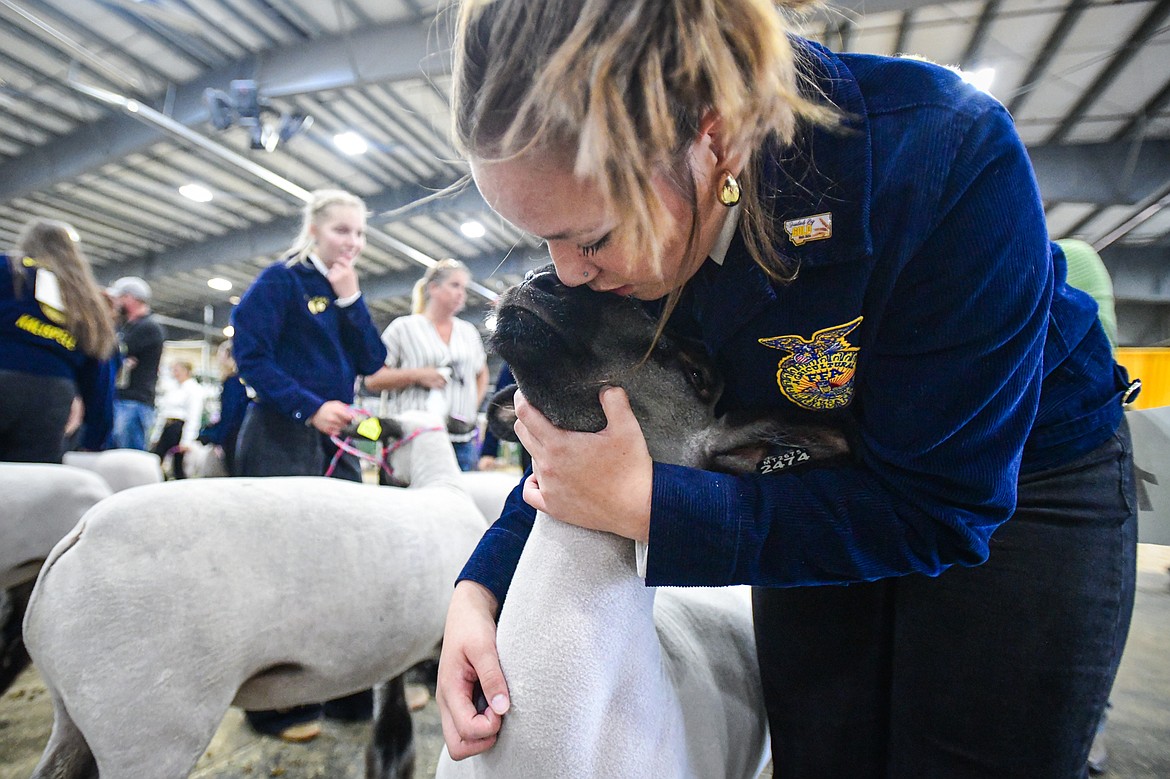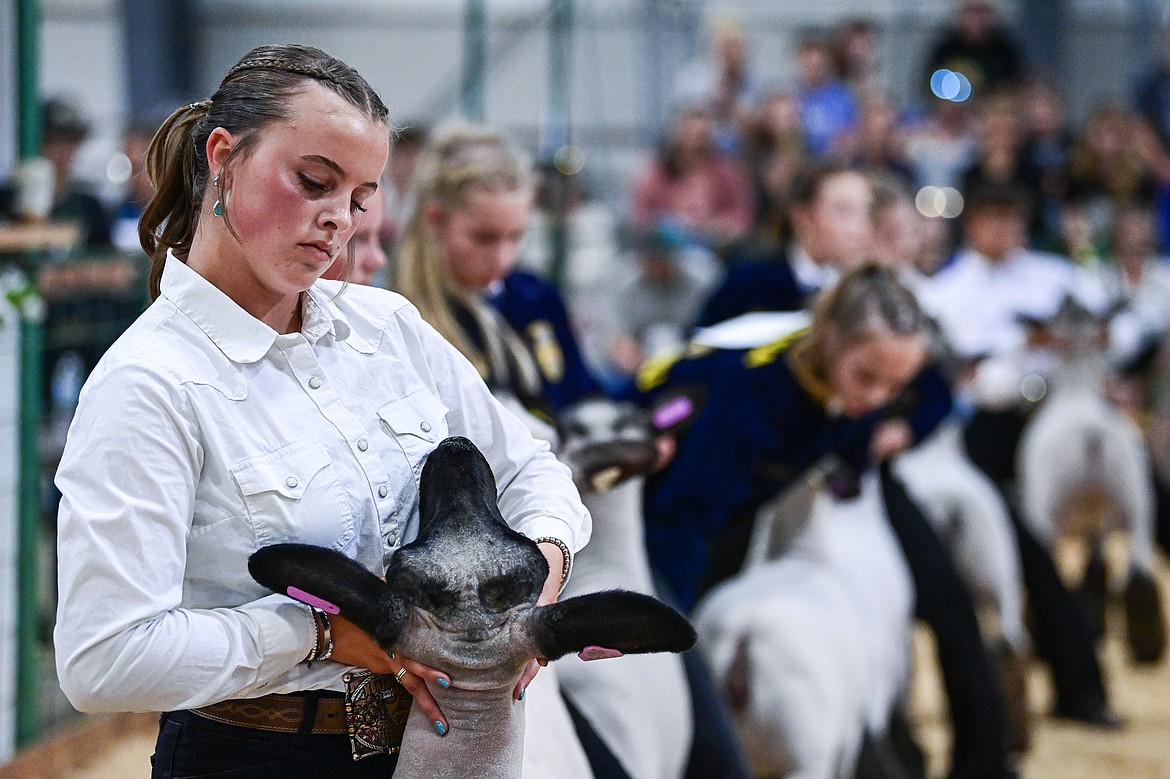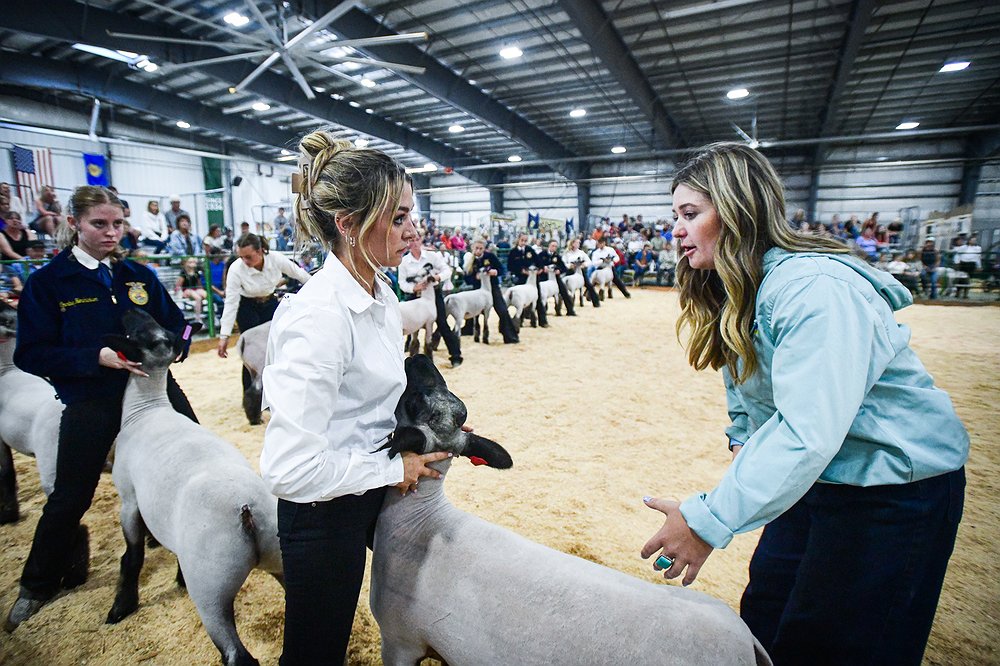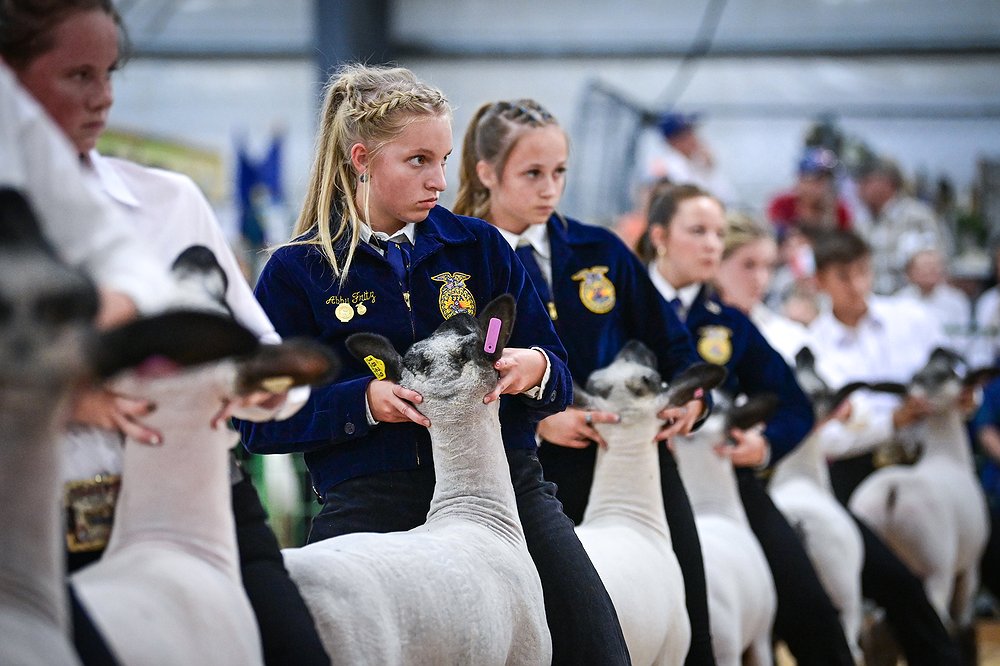Showing sheep is serious business for competitors at Northwest Montana Fair
To show sheep, one cannot be sheepish. The animal needs a handler that can roll with punches — a testament to how much young competitors train for the Northwest Montana Fair.
The sheep show kicked off in the Trade Center at the Flathead Fairgrounds on Tuesday, where FFA and 4-H members competed in showmanship and market and breed judging.
McKinley Bean,18, has been showing sheep for nine years. She was preparing to enter the ring for the last time when her sheep Millven started chomping on the paper number taped to her back.
“I've had a couple numbers ripped up this year,” Bean laughed.
Bean said she heard the judge was tough this year, so she was trying to make a game plan for her and her sheep.
“Millven sometimes can walk really slow and that doesn't look good if I hold up the line. Or sometimes he fidgets when I try and set him up, and it doesn't look good if they see you struggling,” Bean said. “So, try and just make it as smooth and easy as possible, just smooth sailing the whole time.”
She said her sheep started being more friendly recently, so she’s not looking forward to the sale. The young handlers raise an animal all year to see it go to market and it can occasionally be tough to let them go. However, competitors can earn a lot of cash from the sale. Last year, the auction hit another record surpassing $1.2 million in sales from nearly 300 animals.
Sheep showmanship is judged on a few different merits, according to judge Sierra Myers. She was looking for kids to exemplify the basics, which include having decent control over the animal and maintaining eye contact with the judge.
“I'm going to be a stickler about making sure that they switch sides, if I move to the other side, kids are supposed to switch correctly, making sure that they're also getting their animals set up quickly,” Myers said. “Eye contact is a big thing, if we're not having eye contact. That's like the first thing you teach kids in showmanship is to look at the judge.”
For market judging, Myers said they’re looking for a build that shows both muscle and fat — they don’t want the sheep too fat, because “muscle equates to meat.”
FFA member Nick Taylor, 16, said his mind was racing before he entered the ring with his sheep Lambert. He's new to the competition this year and is a new member of the FFA as well. He was interested in showing sheep so he can move on to showing steers next year. Competitors must show pigs or sheep one year before moving on to the larger animal.
“Sheep teach more responsibility because they are temperamental, pigs are easier,” Taylor said.
Competitors like Courtney Hendrickson, 17, said she is drawn to sheep for their personalities. Though sometimes they can be less predictable than other livestock, she loves working with them.
“I love their personalities. They're very giddy ... mine right now is like an old man who's like, really laid back. He loves people, loves little kids,” she said.
Hendrickson is the junior assistant manager for the Sheep Barn again this year. She said she enjoys getting to be with the community and helping show the younger competitors the ropes.
“It definitely builds up your confidence — just talking to others and getting out of your comfort zone is a big part of it. And just hanging out with people, we're here all week,” Hendrickson said.
If there’s one thing Harper McGuire,11, is confident in, it’s her love of sheep showing. She recently wrote a paper for school that compared the benefits of showing sheep versus miniature horses.
“Lambs are easier, because in market you can have a halter on it just in case you can’t get behind it,” McGuire said.
She is one of many who choose to raise multiple lambs in preparation for competition each year. This is beneficial for a few reasons: because sheep are pack animals they tend to mind better in numbers, and if one sheep is a little cantankerous leading up to a show, it’s easy to switch and work with another who is a little calmer that day.
That’s how Paige Morrison, 17, prepared for this season. Raising sheep is a family tradition, and there were four at the fair this year for her and her brother to choose from. She’s going to compete in nationals this fall.
“It's a lot sometimes, but it's super fun just to know that my great-grandparents have been through the same things I have and I'm just continuing it. Hopefully my kids will continue it one day,” Morrison said.
Raising sheep is a family affair for many at the Northwest Montana Fair, like Ron Sargent, who was watching his granddaughter Laila compete with the senior group. Starting with his parents, the family raised sheep commercially. Nowadays, the focus is on show competitions like the fair.
He said the act of raising an animal imparts a lot of lessons on young people.
"Number one they have to care for them — they have to feed them, water them, they work with them. There's a ton of work that goes into it, but it really teaches them those life skills of being responsible,” Sargent said.
It wasn’t too long after Ron Sargent shared his family history that his granddaughter was declared Grand Champion in her division for the showmanship competition. Laila Sargent, 16, has been showing sheep for six years in both state and national competitions.
She said the community is very supportive and that she feels lucky to carry on her family tradition. Her sponsor and team are comprised of the crew from Lost Lake Show Lambs in Kalispell and her family.
“I've had opportunities that generations before me haven't had and I'm very blessed that we have a stock show industry that's moving forward and evolving and changing for the better of the youth,” Sargent said.
She also recently won Master Showman at the Montana Royal Junior Livestock Show in July. In 2023, she won Grand Champion Market Lamb at the competition.
Like many of the other competitors at Tuesday’s show, Sargent said she wants to continue working with animals after high school. While many said they want to go into veterinary school, Sargent said she wants to attend Casper College in Wyoming and become an agricultural educator, but she's eyeing livestock judging as a career.
“I just want to give back to give back to the community that has given so much to me, and I want to continue to foster the love for agriculture in our youth,” Sargent said.
Reporter Taylor Inman can be reached at 406-758-4433 or by emailing tinman@dailyinterlake.com.














